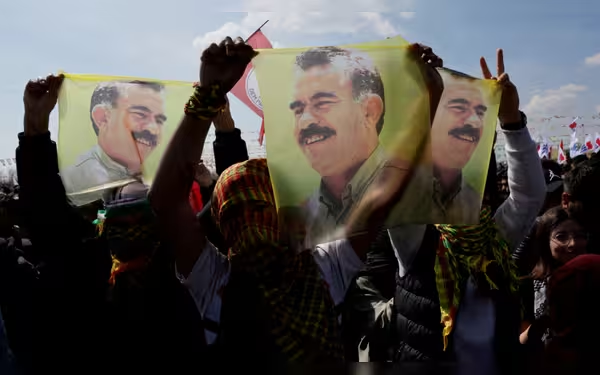Sunday, December 22, 2024 03:42 AM
Erdogan Ally Proposes Talks with Jailed Kurdish Leader Ocalan
- Bahceli urges direct talks with Ocalan for peace.
- DEM Party expresses readiness for dialogue.
- Turkish authorities intensify crackdown on PKK activities.
 Image Credits: arabnewspk
Image Credits: arabnewspkErdogan ally Bahceli calls for talks with jailed Kurdish leader Ocalan, as Turkey navigates ongoing tensions and seeks a peaceful resolution.
In a significant development in Turkey's long-standing conflict with Kurdish militants, a prominent ally of President Tayyip Erdogan has proposed a new approach aimed at ending decades of violence. Devlet Bahceli, the leader of the Nationalist Movement Party, has suggested that the pro-Kurdish party in parliament should engage in direct talks with Abdullah Ocalan, the imprisoned leader of the Kurdistan Workers Party (PKK). This proposal comes after Bahceli previously indicated that Ocalan could announce an end to the insurgency in exchange for the possibility of his release.
The pro-Kurdish Democratic Regions Party (DEM), which is the third largest party in parliament, has responded positively to Bahceli's call. They have applied for their co-chairs to meet with Ocalan, who has been incarcerated on Imrali Island, south of Istanbul, for the past 25 years. Bahceli emphasized the urgency of this dialogue, stating, "We expect face-to-face contact between Imrali and the DEM group to be made without delay, and we resolutely reiterate our call." However, it is important to note that Bahceli has a history of condemning pro-Kurdish politicians, labeling them as instruments of the PKK.
In the past, the DEM's predecessor party was involved in peace negotiations with Ocalan, which took place about a decade ago. Gulistan Kilic Kocyigit, the chairperson of DEM's parliamentary group, expressed the party's readiness to contribute to a democratic solution for the Kurdish issue and the overall democratization of Turkey. Despite these hopeful gestures, the Turkish government, along with its Western allies, continues to classify the PKK as a terrorist organization, with the conflict having claimed over 40,000 lives.
The backdrop of this renewed dialogue is marked by growing regional instability and shifting political dynamics, which may be influencing the Turkish government's willingness to explore peace options. However, the specifics of what a potential peace process might entail remain unclear, as Ankara has not provided any concrete details. The only tangible action taken so far has been the approval for Ocalan's nephew to visit him, marking the first family visit in over four years.
On the other hand, the Turkish authorities are intensifying their crackdown on suspected PKK activities. Recently, police detained 231 individuals believed to have ties to the PKK, including local officials and activists from the DEM Party. This move follows the government's decision to replace five pro-Kurdish mayors in southeastern cities, a step that has drawn criticism from the DEM and other political factions.
As Turkey navigates this complex landscape, the potential for a peaceful resolution to the Kurdish conflict hangs in the balance. While the calls for dialogue are a step in the right direction, the path to lasting peace will require genuine commitment from all parties involved. The situation remains fluid, and the coming weeks will be crucial in determining whether these discussions can lead to meaningful change or if they will be overshadowed by ongoing tensions and crackdowns.













